中西文化差异英文
中西文化差异(英文版)

Differences in thinking
THANKS
Differences in food
Chinese food and western food
In China, we prefer noodles, rice , dumpling as the main course.
We like cooking a lot of delicious dishes, then we set up the tables, put the dishes on the tables, sit together, and taste the dishes together, we don’t eat with individual plates, when we eating ,we like chatting and laughing, we think it’s warm and happy to eat this way;
Culture differences between China and western
As we all know that
there are many
differences between
The culture
China and
includes many
Western,and I think the things,such as
to west countries, you can take part in their joyful night life.
中西文化差异英文PPT

WESTERN AND CHINESE CULTURES HAVE DIVERSE
WAYS TO DEAL WITH LEAVETAKINGS
Western people always try to make their leaving sound reluctant by finding some reasons and apologize for it to make the leaving acceptable for both parties. They often signal several times before leaving. Such as,
EAST&WEST
A Chinese hostess will apologize for giving you “Nothing”. She will say“I just made some dishes casually and they are not very tasty.”
An western hostess is likely to say,” Oh, I am so glad that you liked it. I cook it especially for you.”
4. THANKS AND RESPONSES
In China,“Thank you” is not frequently used between intimate friends and family members, because it may imply a certain distance between the addresser and the addressee.
EAST&WEST
关于中西方文化差异的英语作文_高考满分英语作文4篇
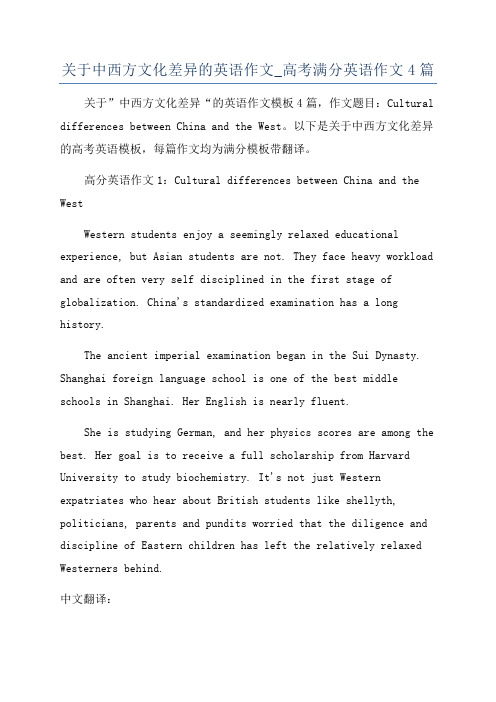
关于中西方文化差异的英语作文_高考满分英语作文4篇关于”中西方文化差异“的英语作文模板4篇,作文题目:Cultural differences between China and the West。
以下是关于中西方文化差异的高考英语模板,每篇作文均为满分模板带翻译。
高分英语作文1:Cultural differences between China and the WestWestern students enjoy a seemingly relaxed educational experience, but Asian students are not. They face heavy workload and are often very self disciplined in the first stage of globalization. China's standardized examination has a long history.The ancient imperial examination began in the Sui Dynasty. Shanghai foreign language school is one of the best middle schools in Shanghai. Her English is nearly fluent.She is studying German, and her physics scores are among the best. Her goal is to receive a full scholarship from Harvard University to study biochemistry. It's not just Western expatriates who hear about British students like shellyth, politicians, parents and pundits worried that the diligence and discipline of Eastern children has left the relatively relaxed Westerners behind.中文翻译:西方学生享受着看似轻松的教育体验,但亚洲的学生却并非如此,他们面临着繁重的工作量,而且在全球化的第一阶段往往非常自律。
中西文化差异(英文).

In China, however, people pursuit the completeness of the family. They think divorce is the last way to solve the family problem. They think they have the responsibility to keep the family peaceful and complete and give a harmony environment to their children to grow healthily.
School Education
Chinese schools have many requirements. For instance, many schools ask students to wear the uniform. And when we are in class, We should sit straightly, listen quietly and take notes.
Conclusion
From what has been discussed above,we can draw a conclusion that different culture add the colorful elements to the world. As far as I am concerned,though west countries have more advantages in living and education.I still like China. Westerners stress individualism, Chinese pay attention to collectivism.
中西方文化差异-英文版

例题(14)When you receive something from a foreigner, you
had better___A___.
A. accept it
B. refuse to accept it
C. return it to him D. buy something in rerurn
A. receiver’s, left B. writer’s, right C. receiver’s, right D. writer’s, left
例题(5)When you write a letter to your father
in English, you had better call,“ C Father”.
❖ While the relationship between western people is relatively simple.(简单)
3. From the view of their thinking orientation:
❖ In western countries: Their thinking orientation(思维取向)inclines to individuals ;
A. Chinese B. American
C. British
D. None of the
例题(43)When you send some expensive presents to American and British people, they receive them_______. A. silently B. without doing and saying anything C. and take them away in silence D. and sing high praise for them in the face of the sender
中西文化差异英文版

The Chinese and western cultural difference 1. The difference of tablewareChinese often use chopsticks. But in west, people use folk and knife 2. The difference between western eating structure andChinese eating structureWesterner’s structure is for the most part meat, protein. Western cooking style is to burn, fried, bake, and stew. The breakfast is often egg, milk, and some bread. And the lunch is buffet. However, in China, the three meals regularly are rice.3. Difference of the eating habits preferencesThe idea of Chinese eating is more perceptual .Not only pay attention to the food authentic flavor, but also do attach importance to form beauty, taste sweet, color finicky. Yet, westerners grasp the food nutrition.Chinese traditional eating habit is based on vegetality food .The chief food is cereal and vegetables are as an auxiliary food, adding up a little meat.Always is cocked food. But westerners are exquisite fresh food constantly are big meat, raw food. The dining-table always set salad, assorted cold dish. Westerners have a special liking to eating raw food, such as raw tomatoes, cucumbers, lettuce, onion, etc.4. The difference of table atmosphereChinese prefer animated and entertaining atmosphere .Delicious food is put in the center of table, and people sit on all sides of it, toast andencourage guests to drink wines, to express a feeling of respect and pleasure, courtesy. Westerners pursue own freedom .You should be quiet; at least you can not speak loudly. Westerners think that it is impolite to speak when you are stuffed.5. The difference of table equitiesIn western countries, all activities are going by arranged beforehand time .The formal party requires to arrive in time. If you are late for 10 minutes, it will be regarded to be bad manners. It is not respectful to the host .But in china, people tend to be late or arrive early. And also in west, the guests should dress up and frequently it is necessary to dress formal attire. In China, it is enough to dress cleanly.In west, we should seat uprightly, do not put elbows in the table, and try to use folk and knife, not to use hand to hold. When you drink soup, do not sip. Just chew no sound. When you eat fish or meat, do not vomit directly, you can use napkins, and throw it in the folk next put into plate.6. Traditional ideasChinese are deeply influenced by Buddhism and advocate not killing animals.Therefore, chineses are predisposed to vegetables but not meat sand fishes. Westerners succeed national tradition and go hunting out to sea. So Chinese vegetarians have difficulties in adapting themselves to westerneating habit that three meals are pork and steak.There are some tips I research about using tableware 1.American eating habit is funny. They eat almost everything with a fork, and it appears that holding a knife in the right hand longer than a few seconds is considered to be against table manners.2. The system is that if it is absolutely necessary to use a knife, people take a fork in their left hand, and cut off pierce of meat or whatever it is in the normal manner. They put the knife down, transfer the fork to their right hands, and only then do transport the food to their mouth. This is ludicrous, but it is considered good manner.3. In west, it is absolutely necessary to use a knife, Americans do not use one, because obviously this get thing complicated. And you will therefore see them try to cut food like potatoes, fish, and even bacon with a fork.4. Tables are generally laid with one knife and two forks, the outside fork is for the salad .If you do use your knife, remember to save it for the meat.5. Even desserts are eaten with a fork if at all possible, and the spoon to be for coffee (but you use it for your dessert, no one will say anything) But in china, people always use chopsticks, also add some spoons.MichelleClass two。
中西文化差异英文简短
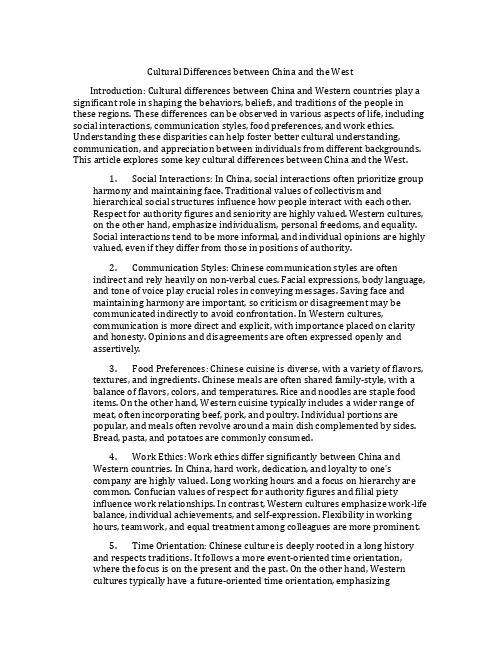
Cultural Differences between China and the WestIntroduction: Cultural differences between China and Western countries play a significant role in shaping the behaviors, beliefs, and traditions of the people in these regions. These differences can be observed in various aspects of life, including social interactions, communication styles, food preferences, and work ethics. Understanding these disparities can help foster better cultural understanding, communication, and appreciation between individuals from different backgrounds. This article explores some key cultural differences between China and the West.1.Social Interactions: In China, social interactions often prioritize groupharmony and maintaining face. Traditional values of collectivism andhierarchical social structures influence how people interact with each other.Respect for authority figures and seniority are highly valued. Western cultures, on the other hand, emphasize individualism, personal freedoms, and equality.Social interactions tend to be more informal, and individual opinions are highly valued, even if they differ from those in positions of authority.munication Styles: Chinese communication styles are oftenindirect and rely heavily on non-verbal cues. Facial expressions, body language, and tone of voice play crucial roles in conveying messages. Saving face andmaintaining harmony are important, so criticism or disagreement may becommunicated indirectly to avoid confrontation. In Western cultures,communication is more direct and explicit, with importance placed on clarity and honesty. Opinions and disagreements are often expressed openly andassertively.3.Food Preferences: Chinese cuisine is diverse, with a variety of flavors,textures, and ingredients. Chinese meals are often shared family-style, with a balance of flavors, colors, and temperatures. Rice and noodles are staple food items. On the other hand, Western cuisine typically includes a wider range of meat, often incorporating beef, pork, and poultry. Individual portions arepopular, and meals often revolve around a main dish complemented by sides.Bread, pasta, and potatoes are commonly consumed.4.Work Ethics: Work ethics differ significantly between China andWestern countries. In China, hard work, dedication, and loyalty to one’scompany are highly valued. Long working hours and a focus on hierarchy are common. Confucian values of respect for authority figures and filial pietyinfluence work relationships. In contrast, Western cultures emphasize work-life balance, individual achievements, and self-expression. Flexibility in working hours, teamwork, and equal treatment among colleagues are more prominent.5.Time Orientation: Chinese culture is deeply rooted in a long historyand respects traditions. It follows a more event-oriented time orientation,where the focus is on the present and the past. On the other hand, Westerncultures typically have a future-oriented time orientation, emphasizingplanning, progress, and achieving goals. Time is seen as a valuable resource to be managed efficiently.Conclusion: Cultural differences between China and the West manifest in various aspects of life, including social interactions, communication styles, food preferences, work ethics, and time orientation. Recognizing and appreciating these disparities can help individuals from different backgrounds develop better cross-cultural understanding and collaboration. By fostering cultural sensitivity and embracing diversity, we can build bridges between cultures and promote harmony in an increasingly interconnected world.。
中西文化差异(英文版)

b
1
As we all know that
there are many
differences between
The culture
China and
includes many
Western,and I think the things,such as
28
b
29
b
30
THANKS
b
31
b
5
Cooking skills
b
6
b
7
Differences in wedding
b
8
b
9
b
10
b
11
b
12
Differences in painting
b
13
b
14
b
15
b
16
b
17
Differences in education
Chinese education
Western education
But in most west countries, people live in a easy and happy
lives. They get up late and go to work late too, they go to pubs, bars to have a rest after they finish their work, they enjoy their holidays, they seldom go to work during the weekend. if you go
中西方文化差异英文版

Parting in China
• Good Bye • Bye
throws the embroidered ball
In China
• Bride and bridegroom • The date of birth and the eight characters of a horoscope • Red clothes(the red color represents lucky) • Bridal sedan chair • Cross-cupped wine
Parting in English
• Western people always find some reasons for their leaving. Such as: • “I am afraid I must be off, I have to …” • “Well, it’s been nice to see you again. I do enjoy our talk and the lovely dinner, but I must be going soon”. • “Thank you very much for asking me over. I hope we’ll be able to get together again before long…”
Contents
1.Greeting and Parting 2.Marriage customs 3.Eating customs
Greeting in China
• When people meet acquaintances or friends, we always say : • Have you eaten yet? • What are you going to do?
谈谈中西方文化差异用英语写作文
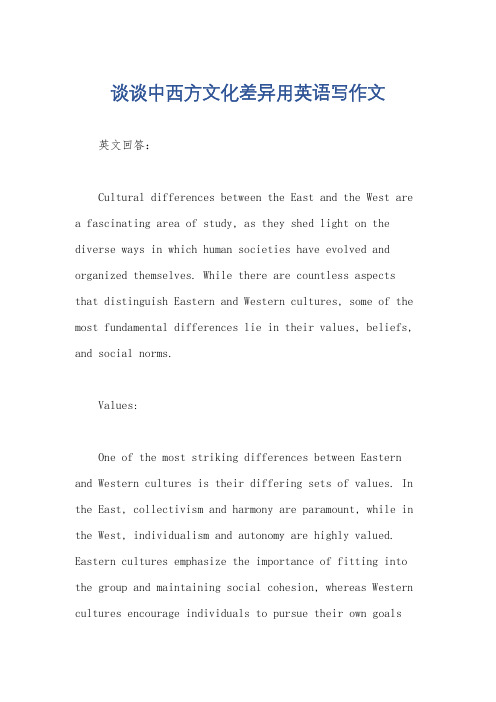
谈谈中西方文化差异用英语写作文英文回答:Cultural differences between the East and the West are a fascinating area of study, as they shed light on the diverse ways in which human societies have evolved and organized themselves. While there are countless aspects that distinguish Eastern and Western cultures, some of the most fundamental differences lie in their values, beliefs, and social norms.Values:One of the most striking differences between Eastern and Western cultures is their differing sets of values. In the East, collectivism and harmony are paramount, while in the West, individualism and autonomy are highly valued. Eastern cultures emphasize the importance of fitting into the group and maintaining social cohesion, whereas Western cultures encourage individuals to pursue their own goalsand desires.Beliefs:Another fundamental difference lies in the religious beliefs and spiritual practices that prevail in each region. Eastern cultures are heavily influenced by Easternreligions such as Buddhism, Confucianism, and Taoism, which emphasize concepts of karma, reincarnation, and the interconnectedness of all things. Western cultures, on the other hand, are rooted in the Judeo-Christian tradition, which places a strong emphasis on monotheism, personal salvation, and the separation between humans and God.Social Norms:The social norms and customs that shape daily life in Eastern and Western cultures also differ significantly. In the East, there is a strong emphasis on respect for authority, hierarchy, and tradition. Individuals are expected to conform to social expectations and avoidcausing shame to their family or community. In the West,social norms are more egalitarian, and individuals are encouraged to question authority and express their own viewpoints.Communication:Communication styles also vary between Eastern and Western cultures. In the East, communication tends to be indirect and implicit, with a focus on non-verbal cues and subtle hints. In the West, communication is often more direct and explicit, with a strong emphasis on clarity and efficiency.Time Perception:Another notable difference is in the way that Eastern and Western cultures perceive time. Eastern cultures tend to view time as cyclical and fluid, while Western cultures view it as linear and finite. This difference can manifest in various aspects of life, such as attitudes toward work, leisure, and personal relationships.These are just a few examples of the countless cultural differences that exist between the East and the West. These differences shape everything from the way that people interact with each other to the way that they view theworld around them. Recognizing and understanding these differences is crucial for fostering mutual respect and cooperation between cultures.中文回答:文化差异。
中西方文化差异(最全完美版)-英文演讲
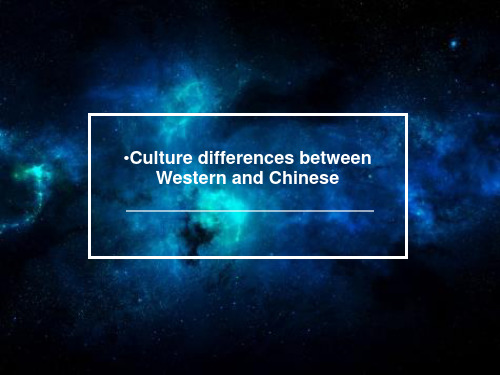
The difference of drinking
Page
Tea and Wine
Page
Chinese people love tea while westerners prefer to drink red wine
The difference of table manners(餐桌礼仪)
图示_03
Westerners:Little groups Chinese:Large groups
Page
图示_03
Westerns:order Chinese:disorder
Page
图示_03
Westerners:equal Chinese:toБайду номын сангаас
Page
图示_03
Westerners:living with pets Chinese:living with children
Culture differences between Western and Chinese
The difference idea about food(饮食理念)
Page
Chinese
What Chinese people care about is the deliciousness of food.
conclusion
Different countries have different cultures.
Fully understand and respect when communicating with people from different countries
Remove gross while keeping the essence
中西方文化差异英文版
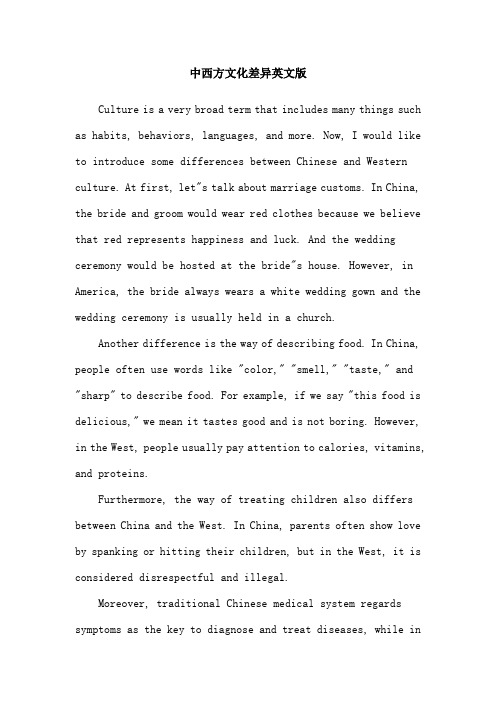
中西方文化差异英文版Culture is a very broad term that includes many things such as habits, behaviors, languages, and more. Now, I would like to introduce some differences between Chinese and Western culture. At first, let"s talk about marriage customs. In China, the bride and groom would wear red clothes because we believe that red represents happiness and luck. And the wedding ceremony would be hosted at the bride"s house. However, in America, the bride always wears a white wedding gown and the wedding ceremony is usually held in a church.Another difference is the way of describing food. In China, people often use words like "color," "smell," "taste," and "sharp" to describe food. For example, if we say "this food is delicious," we mean it tastes good and is not boring. However, in the West, people usually pay attention to calories, vitamins, and proteins.Furthermore, the way of treating children also differs between China and the West. In China, parents often show love by spanking or hitting their children, but in the West, it is considered disrespectful and illegal.Moreover, traditional Chinese medical system regards symptoms as the key to diagnose and treat diseases, while inthe West, people usually consult doctors or pharmacists to diagnose their diseases.In conclusion, there are many differences between Chinese and Western culture, such as marriage customs, food description, child-rearing practices, and medical systems. These differences reflect the diversity and richness of human cultures and should be 尊重和欣赏。
中西方文化差异英语作文
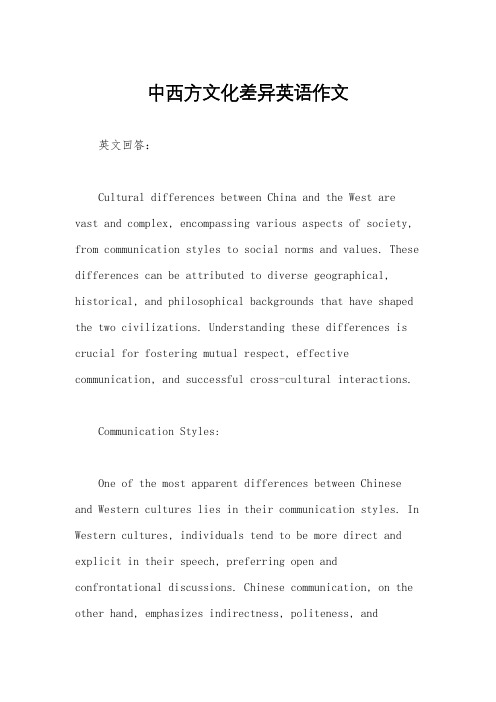
中西方文化差异英语作文英文回答:Cultural differences between China and the West are vast and complex, encompassing various aspects of society, from communication styles to social norms and values. These differences can be attributed to diverse geographical, historical, and philosophical backgrounds that have shaped the two civilizations. Understanding these differences is crucial for fostering mutual respect, effective communication, and successful cross-cultural interactions.Communication Styles:One of the most apparent differences between Chinese and Western cultures lies in their communication styles. In Western cultures, individuals tend to be more direct and explicit in their speech, preferring open and confrontational discussions. Chinese communication, on the other hand, emphasizes indirectness, politeness, andharmony. Chinese speakers often use euphemisms, subtle gestures, and implicit meanings to convey messages.Social Norms and Values:Social norms and values also exhibit significant variations between the two cultures. Western societies prioritize individualism and personal autonomy, encouraging people to express their opinions freely and pursue their own ambitions. In contrast, Chinese culture emphasizes collectivism and social harmony, valuing conformity, respect for authority, and the preservation of relationships.Hierarchy and Power Structures:Hierarchical structures and power dynamics differ markedly in Chinese and Western cultures. Western societies tend to adopt a more egalitarian approach, whereindividuals are generally treated as equals and have equal rights and opportunities. In Chinese culture, hierarchy plays a more prominent role, with clear distinctionsbetween superiors and subordinates in both social and professional settings.Time Perception and Punctuality:Time perception and punctuality are other areas where cultural differences manifest. Western cultures place a high value on timeliness and punctuality, adhering tostrict schedules and viewing time as a linear progression. Chinese culture, on the other hand, often perceives time as fluid and cyclical, with a greater emphasis on flexibility and adaptability rather than strict adherence to schedules.Religion and Spirituality:Religion and spirituality also contribute to cultural differences. Western cultures have been predominantly influenced by Christianity, which emphasizes the importance of individual faith, salvation, and a direct relationship with God. Chinese culture, on the other hand, is characterized by a blend of indigenous beliefs, Buddhism, Confucianism, and Taoism, which promote a holistic view ofthe world, harmony with nature, and ancestral reverence.Food and Dining Customs:Food and dining customs reflect cultural differences as well. Western dining etiquette typically involvesindividual meals eaten using utensils at a table, with an emphasis on portion control and table manners. Chinese dining customs, in contrast, often emphasize communal dining, with food shared among multiple individuals using chopsticks. Food is often served in large portions, and there is a greater emphasis on variety and flavor.中文回答:中西方文化差异。
中西方文化差异 英文版

• Westerner has more conception on space than on place.
People always walk towards windows once come into an American house in the country side.
On the contrary, let’s have a look at a traditional Chinese house.
things, invention and expand outwards. For instance, bungee jumping is considered adventurous and common in western culture.
• Chinese culture that is based on humanism and people. You will probably find no-one doing such
My Notion
• That’s the differences I found and read from some materials. • Though we know west countries have more advantages in living, I still believe that “East or west , home is best”, I still think China will always be my deeply loved mother. • Chinese culture is intensive and has a long
history. We need to cherish and carry forward Chinese culture.
中西方文化差异(英文版)

The culture includes many things,such as habits languages and so on.Now I want to introduce something about it.
In American the bride always in her white wedding gown and their wedding will be host in a church.
Chinese often use these words such as color 、smell 、taste、sharp to describe the food.
The host will prepare all the things well.in addition the host will get something tast well into the gust’s bowl .
Americans would like to keep quiet and maegard the right as a symbol of respect.
Now we have known somethings about the different and we know that because the different culture、background and custom,we don’t know each other very well.so in my opinion we should commuciate with each other and only in this way could American and China be more peacefull!
中西方文化的差异(英文版)

Content Abstract
• Marriage Style
Building Differences
With Chinese, western countries are used to eat three meals a day. General to eat breakfast cereal, eggs, toast and milk, etc.; Chinese food is simpler, or take some food from home, or to a fast food restaurant drink coffee, a sandwich; A formal dinner and abundant. General quite complete dinner including 1) an appetizer, such as beverages, salad,and soup; 2) the main course; 3) sweets, cookies, ice cream or fruit, etc
Secondly,I Secondly,I'd like to talk about the marriage customs.In our China the bride and bridegroom would in red because we believe the red color reprsents lucky and the wedding would be host in the bridegroom’ bridegroom’s house .
Chinese Cooking
•
中西文化差异(英文)PPT课件
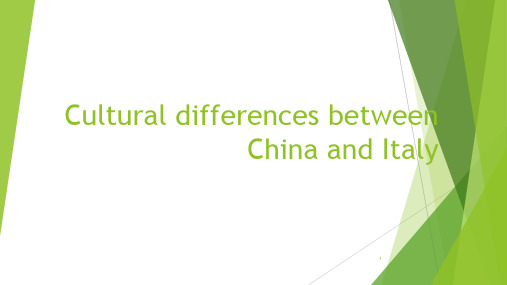
1
Education
taly‘s public education is free and compulsory from 6–14 years of age. It has a five-year primary stage and an eight-year secondary stage, divided into firstgrade secondary school (middle school) and second-grade secondary school (or high school). Italy has both public and private education systems.
6
1.Greeting
In America, people often use the following expressions to greet each other “Good morning/evening/afternoon. “Fine day, isn’t it? ”How is everything going?”
Etiquette difference between China and America
5
Due to the different history and culture of China and the United States, The two people in the decency communication habits have many differences.
Primary school lasts five years. Until middle school, the normal educational curriculum is uniform for all: although one can attend a private or state-funded school, the subjects studied are the same, except in special schools for pupils with different care requirements.
- 1、下载文档前请自行甄别文档内容的完整性,平台不提供额外的编辑、内容补充、找答案等附加服务。
- 2、"仅部分预览"的文档,不可在线预览部分如存在完整性等问题,可反馈申请退款(可完整预览的文档不适用该条件!)。
- 3、如文档侵犯您的权益,请联系客服反馈,我们会尽快为您处理(人工客服工作时间:9:00-18:30)。
Western and Chinese cultures have diverse ways to deal with leave-takings
Western people always try to make their leaving sound reluctant by finding some reasons and apologize for it to make the leaving acceptable for both parties. They often signal several times before leaving. Such as,
East&West
A Chinese hostess will apologize for giving you “Nothing”. She will say“I just made some dishes casually and they are not very tasty.”
An western hostess is likely to say,” Oh, I am so glad that you liked it. I cook it especially for you.”
1.Greeting and Parting
In China, when people meet acquaintances or friends, we always say ,“Have you eaten yet?” What are you going to do?”
In English, people often employ the following expressions to greet each other “Good morning/afternoon/evening. “Fine day, isn’t it? ”How is everything going?”,etc
4. Thanks and Responses
In China,“Thank you” is not frequently used between intimate friends and family members, because it may imply a certain distance between the addresser and the addressee.
The Difference between Chinese and Western Culture
Contents
1.Greeting and Parting 2.Addressing pliments and Responses 4. Thanks and Responses 5. Asking Personal Affairs 6.Invitation
them surnames, while the superior even first names .They demonstrate
or elders call the addressers their the sense of intimacy and the
names. f” Everyone is created
1.“I am afraid I must be off, I have to …” 2.“Well, it’s been nice to see you again. I do enjoy our
talk and the lovely dinner, but I must be going soon”. 3.“Thank you very much for asking me over. I hope
East&West
In east, chinese use “title
In west, Although they are different
+surname” to address their
in age and status, they can call the
superior or elders rather than call other directly, namely, their names,
What can we see from it?
The Americans are “straight forwardness”, the Chinese take pride in “modesty”. In the response to compliments. Chinese are tend to efface themselves in words or refuse it, although they do feel comfortable about the compliments.
may be considered as ill mannered,
ill educated or rude.
equal”
pliments and Responses
For example, if a hostess is complimented for her cooking skill ,how will she response in west and china?
we’ll be able to get together again before long…”
2.Addressing
In China, the surname comes first and then the given name.
While westerners names are written and spoken with the given name first and the family name last .
